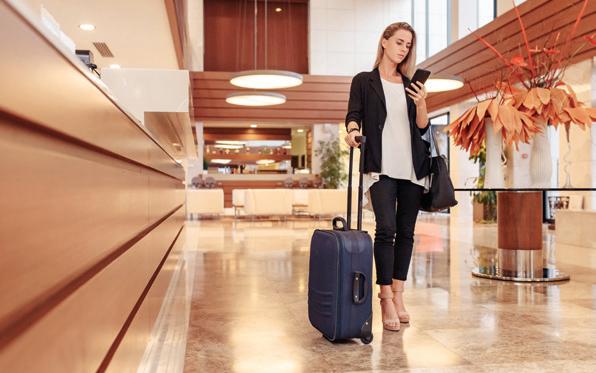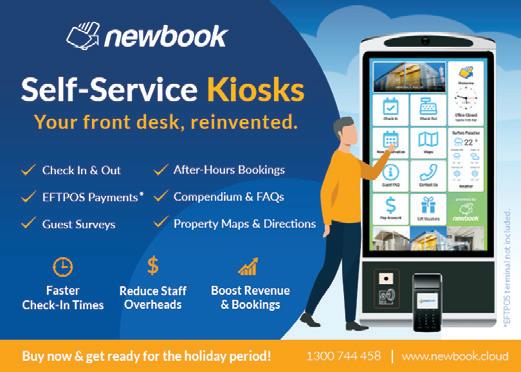
5 minute read
Less contact,but stronger relationships
Less contact
but stronger relationships
By Grantlee Kieza, Industry Reporter
Pressure creates diamonds and warfare has given us such technological innovations as jet aircraft and GPS navigation.
So, it is with the scourge of COVID that there are bright lights at the end of the tunnel.
Among them will be the rise of contactless check-ins at hotels. Not only do self-service kiosks and mobile check-ins limit the physical contact between guests and staff , minimising any health concerns, but they are becoming key features for property managers to increase effi ciency and revenue.
While Airbnb has been using a contactless check-in system for a decade, COVID has forced the hotel industry to get on board the latest technological advances in the accommodation sector.
Dean Long, the CEO of the Accommodation Association of Australia, was recently at the brand-new Crowne Plaza Sydney Darling Harbour and was impressed with the “completely contactless check-in”.
“Technology and the way we engage with our guests is going to change forever,” Mr Long said. “As an industry there has been a signifi cant cost barrier to investing in contactless technology, however what the pandemic has meant is we had to bring those costs into hotels to operate.
“What the airline industry did 10 years ago with mobile checkin has allowed customers to select their seats and select their meals before they fl y.
“It created an increase in effi ciency and for corporate travellers aft er COVID contactless check-ins will make hotels much more att ractive because, for one thing, guests no longer have to line up to check in and check out, but can do it remotely.
“There will no longer be the glut of 10:00 check-out or 15:00 check-ins at reception and people who travel frequently will be able to order the same room online that they always stay in.
“It's a really exciting time for hotel ownership. Hotels have to invest in those type of products not just to be competitive but to be able to operate in the postCOVID world. It’s going to help future-proof the industry.”
Contactless check-ins allow hotels to adhere to all the health and safety guidelines that COVID has forced, but mobile checkin also allows guests to stay in touch with hotel staff even if they do not see them in person.
Guests feel special and connected to the hotel even before they come through the front door, partly because they feel in control of their accommodation, sett ing out their room requirements and preferences well before arrival.
The contactless check-in process will also allow guests to make dining reservations or book extra services such as massages. Identifi cation such as passports can then be entered by a self-service kiosk at the hotel, which airports have been using for many years.
The information will help hotels gain greater insights into their guests and their requirements, which makes for a more satisfi ed customer, more positive reviews, and more repeat business.
The hotel is able to build an extensive database to improve guest services and to promote special deals by email, creating brand loyalty by making guests part of a hotel’s community.
Michael Johnson, the CEO of Tourism Accommodation Australia, said contactless check-ins were coming into the hotel industry before COVID, but that the pandemic had “expedited” their uptake. “Consumers are quickly gett ing accustomed to them,” Mr Johnson said. “It’s not that long ago that noone had heard of a QR code and yet now we are all very comfortable gett ing out our phones and putt ing down our names and details and hitt ing `submit’.
“It will be the same for accommodation hotels. We are all gett ing used to contactless entry into buildings.
“It’s a good thing for both health and for effi ciencies for the guest and the hotel. It doesn’t mean you won’t have contact with the staff because they will still be there and you can have an interaction and speak to them but there will be much less physical contact.
“Yesterday, I entered a hotel with all guests going through one entry door. As guests arrived, we were scanned in front of a piece of equipment a metre and a half away that did a visual of your face and said `temperature normal’. We were then off ered a mask to be within the property.
“It makes for a much safer environment that we need now.
“The COVID protocols are really stepping up, and the technology is with us now as people are gett ing the urge to travel again.”
Contactless check-in reigns supreme in 2020
NewBook’s Self-Service Kiosks present a safer, speedier alternative to traditional check-in for tourists eager to explore once again.
Self-service check-in systems have skyrocketed in popularity over the past fi ve years.
With tech-savvy millennial travellers now taking over the tourism industry, the reason for the ever-growing demand is clear to see.
But as millennials shift their preferences towards convenience and overall effi ciency, the wider tourist population also becomes increasingly enthusiastic about contactless check-in for a very diff erent reason; safety.
When innovation becomes a necessity
The interest in contactless service became glaringly apparent this year, as did an urgent call for self-service technologies. This prompted NewBook to fast-track their product launch to meet consumer needs, aff ording accommodation businesses with a tool to perform daily administrative duties without the requirement for face-to-face contact.
Unlike other check-in systems, NewBook Self-Service Kiosks combine the power of their coveted Booking Engine, Property Management System, and newly introduced integrated payment solution, NewBook Payments, to deliver a safe and seamless check-in experience that allows guests to benefi t from features unique to NewBook and take control of their own stays.
For owners, the kiosks help to reduce overheads by automating the check-in process, and minimising front desk duties and the need for 24/7 staffi ng. The technology lets guests check in and out, view maps and property information, make walk-in bookings, search for directions, and even place secure, card-present payments, all minus the human element, crowded reception areas, and long waiting times. The vibrant 32-inch touch screens and steel frames can also be customised to suit the branding of each business and off er an additional point of promotional real-estate.
The kiosks aren’t NewBook’s fi rst foray into contactless check-ins, however. The company already enlists a host of technology aimed at making the customer experience contact-free, including a dedicated mobile app and an SMS check-in system allowing guests to advise of their arrival and complete their check-in documents through an online portal.
What does the future look like?
With the tourism industry more under pressure than ever before, hospitality providers who fail to adjust to the new landscape will surely see a decline in foot traffi c. In fact, up to 70% of consumers are now more likely to stay at a hospitality business that implements self-service systems, meaning things are looking up for those who have implemented tools like NewBook’s Self-Service Kiosks.











